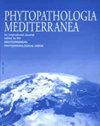突尼斯首例引起油菜黑腿病的斑点细带绦虫和大细带绦虫
IF 1.9
3区 农林科学
Q2 AGRONOMY
引用次数: 0
摘要
自2017年以来,在突尼斯的油菜中发现了黑腿病。形态学观察、致病性测试和内部转录间隔区测序证实了4株受感染植物分离的黄斑钩球绦虫和大叶钩球绦虫的存在。这些结果为突尼斯油菜黑腿病的起因提供了首次记录。本文章由计算机程序翻译,如有差异,请以英文原文为准。
First report of Leptosphaeria maculans and Leptosphaeria biglobosa causing blackleg disease of oilseed rape in Tunisia
Blackleg has been observed in oilseed rape in Tunisia since 2017. Morphological observations, pathogenicity tests, and sequencing of the internal transcribed spacer regions for four fungal isolates from affected plants confirmed the presence of Leptosphaeria maculans and Leptosphaeria biglobosa. These results provide the first record of L. maculans and L. biglobosa as causes of blackleg of oilseed rape in Tunisia.
求助全文
通过发布文献求助,成功后即可免费获取论文全文。
去求助
来源期刊

Phytopathologia Mediterranea
生物-植物科学
CiteScore
4.40
自引率
8.30%
发文量
28
审稿时长
6-12 weeks
期刊介绍:
Phytopathologia Mediterranea is an international journal edited by the Mediterranean Phytopathological Union. The journal’s mission is the promotion of plant health for Mediterranean crops, climate and regions, safe food production, and the transfer of new knowledge on plant diseases and their sustainable management.
The journal deals with all areas of plant pathology, including etiology, epidemiology, disease control, biochemical and physiological aspects, and utilization of molecular technologies. All types of plant pathogens are covered, including fungi, oomycetes, nematodes, protozoa, bacteria, phytoplasmas, viruses, and viroids. The journal also gives a special attention to research on mycotoxins, biological and integrated management of plant diseases, and the use of natural substances in disease and weed control. The journal focuses on pathology of Mediterranean crops grown throughout the world.
The Editorial Board of Phytopathologia Mediterranea has recently been reorganised, under two Editors-in-Chief and with an increased number of editors.
 求助内容:
求助内容: 应助结果提醒方式:
应助结果提醒方式:


